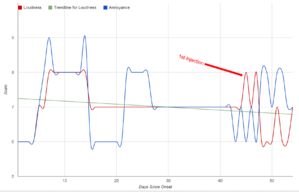@OddV
I also wondered about that aspect of the report from phase 2 but that is what it says.
So are we suggesting that the clinical reports may not be really accurate in their findings? Cos it is not possible?
Even tho the numbers reporting on this trial are small, no one has as yet reported an improvement after day 2. On the contrary, the reports have only been that the T is up in the beginning (and then subsides in time) plus fullness of head or ears which also subsides in time. But the T going down on day 2, that has not happened to anyone posting.
Just like the injections are supposed to be completely painless......? For some they have been painful but then again pain is different for each individual.
What do you think?
I also wondered about that aspect of the report from phase 2 but that is what it says.
The improvement in tinnitus was gradual over the 90-day observation period (Fig. 3). In the first days, tinnitus loudness increased slightly as the eardrum was still open and sound perception may have been temporarily altered. TLQ started to improve in the high-dose group on Day 2, before the third injection, breaking away from the 2 other groups. At Day 90, the mean tinnitus loudness in the high-dose group was 43.2% lower than at baseline (49.5% for unilateral cases). This compares with an improvement of 17.7% (10.0%) for the placebo group.
So are we suggesting that the clinical reports may not be really accurate in their findings? Cos it is not possible?
Even tho the numbers reporting on this trial are small, no one has as yet reported an improvement after day 2. On the contrary, the reports have only been that the T is up in the beginning (and then subsides in time) plus fullness of head or ears which also subsides in time. But the T going down on day 2, that has not happened to anyone posting.
Just like the injections are supposed to be completely painless......? For some they have been painful but then again pain is different for each individual.
What do you think?

 Member
Member



 Founder
Founder